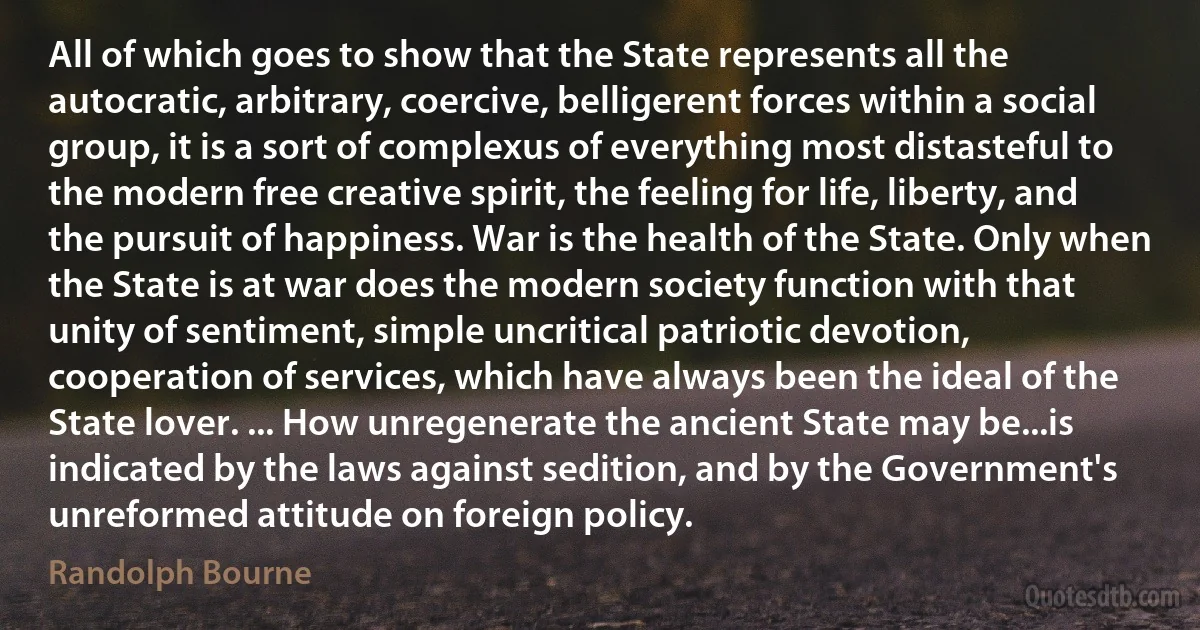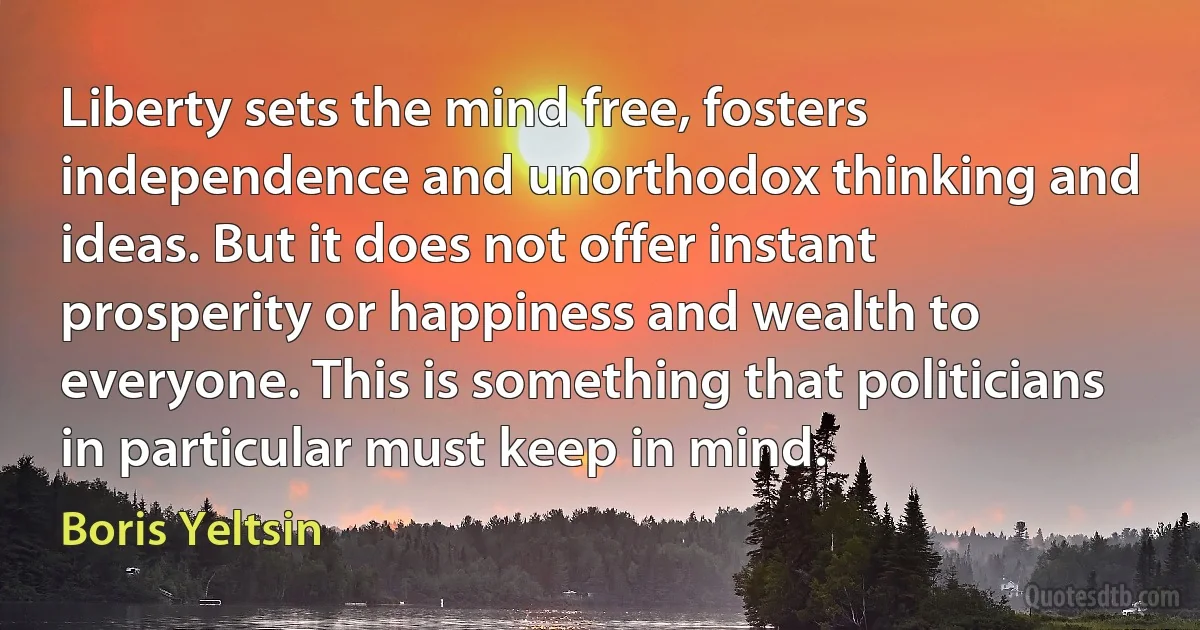Liberty Quotes - page 100
At the heart of the First Amendment is the recognition of the fundamental importance of the free flow of ideas and opinions on matters of public interest and concern. The freedom to speak one's mind is not only an aspect of individual liberty – and thus a good unto itself – but also is essential to the common quest for truth and the vitality of society as a whole. We have therefore been particularly vigilant to ensure that individual expressions of ideas remain free from governmentally imposed sanctions. The First Amendment recognizes no such thing as a "false" idea.

William Rehnquist
My subject is a city of the future under a Democratic government. Some very great men, and among them Herbert Spencer and Lord Macaulay, have predicted the downfall of the American democracy. Nevertheless, having firm confidence in our new mixture of bloods, our new environment, our searching publicity and our growing intelligence, I cannot doubt that the American democracy will persist. It takes far greater ability to subvert liberty now than ever before since man's history began, and so I promise permanence to democratic institutions.
To these is vitally related the future of the cities. Plenary democracies can do what we want them to do. They have full power over men, land and goods, and can always make their laws and execute their purposes. Democratic peoples, when they perceive the value of plans to bring convenience and beauty into the hearts of cities can get such plans carried out.

Daniel Burnham
If a man has a genuine, sincere, hearty wish to get rid of his liberty, if he is really bent upon becoming a slave, nothing can stop him. And the temptation is to some natures a very great one. Liberty is often a heavy burden on a man. It involves that necessity for perpetual choice which is the kind of labor men have always dreaded. In common life we shirk it by forming habits, which take the place of self-determination. In politics party-organization saves us the pains of much thinking before deciding how to cast our vote.

Oliver Wendell Holmes, Sr.
You also make sure that the state knows its place, not only in relation to the economy, but in relation to the citizen. You are in favour of the right of dissent and the liberty of private conduct. You are against unnecessary centralization and bureaucracy. You want to devolve decision-making wherever you sensibly can. You want parents in the school system, patients in the health service, residents in the neighbourhood, customers in both nationalized and private industry, to have as much say as possible. You want the nation to be self-confident and outward-looking, rather than insular, xenophobic and suspicious. You want the class system to fade without being replaced either by an aggressive and intolerant proletarianism or by the dominance of the brash and selfish values of a 'get rich quick' society. ... These are some of the objectives which I believe could be assisted by a strengthening of the radical centre.

Roy Jenkins
[T]he Pact must be regarded as a concrete expression of the identity of view long held among the Western nations. It recognises the common heritage and civilisation of their peoples, founded on principles of democracy, individual liberty and the rule of law between nations. It is not elaborate; its simplicity is apparent, but I can assure the House that it is based on an understanding and determination to preserve our way of life.

Ernest Bevin
I see that you are in fears again from your White Boys, and have destroyed a good many of them; but I believe, that if the military force had killed half as many landlords, it would have contributed more effectually to restore quiet. The poor people in Ireland are used worse than negroes by their Lords and Masters, and their Deputies of Deputies of Deputies. For there is a sentiment in every human breast that asserts man's natural right to liberty and good usage, and that will, and ought to rebel when oppressed and provoked to a certain degree.

Philip Stanhope, 4th Earl of Chesterfield
If the parliament will positively enact a thing to be done which is unreasonable, I know of no power that can control it: and the examples usually alleged in support of this sense of the rule do none of them prove, that where the main object of a statute is unreasonable the judges are at liberty to reject it; for that were to set the judicial power above that of the legislature, which would be subversive of all government. But where some collateral matter arises out of the general words, and happens to be unreasonable; there the judges are in decency to conclude that this consequence was not foreseen by the parliament, and therefore they are at liberty to expound the statute by equity, and only quoad hoc disregard it.

William Blackstone
[T]he broad record of the British race stands to be judged on facts that are incontestable. It is the fact that during the nineteenth century, when the power of this country was unchallenged, there was no nation in Europe that felt for that reason insecure, or that did not recognize our power to be an instrument of peace. The Pax Britannica has been no empty or self-righteous boast of purpose. It is the fact too that in every corner of the world where men of British race have established influence, there by immutable law of nature you find established the seed and plant of liberty. It is the trail by which is marked their progress, interpreted to all by the standards of good faith, respect for law, and equal justice. Most truly, therefore, of our people was it said: "Their country's cause is the high cause of freedom and honour. That fairest earthly fame, the fame of freedom, is inseparable from the names of Albion, Britain, England.”.

Edward Wood
According to my observation, the change in my own generation is different. They have ceased either to trust or to distrust liberty, and have come to the mind that it matters little either way. Men are disenchanted. They have got what they wanted in the days of their youth, yet what of it, they ask?

John Morley, 1st Viscount Morley of Blackburn
[Rousseau's educational theories had persuaded teachers] to dispense with the structured systems of learning which have been so successful in the past. [The result is] the belief, taught by Mr Roy Jenkins, that a permissive is a civilised society... A facile rhetoric of total liberty and of costless, superficial universal protest has really been a cover for irresponsibility. Our loud talk about the community overlies the fact that we have no community. We talk about neighbourhoods and all too often we have no neighbours. We go on about the home when we only have dwelling places containing television sets. It is the absence of a frame of rules and community, place and belonging, responsibility and neighbourliness that makes it possible for people to be more lonely than in any previous stage in our history. Vast factories, huge schools, sprawling estates, sky-scraping apartment blocks; all these work against our community and our common involvement one with another.

Keith Joseph
As the seventh century [BC] drew to a close, the bitterness of the helpless poor against the legally entrenched rich had brought Athens to the edge of revolution. Equality is unnatural; and where ability and subtlety are free, inequality must grow until it destroys itself in the indiscriminate poverty of social war; liberty and equality are not associates but enemies. The concentration of wealth begins by being inevitable, and ends by being fatal.

Will Durant
Forced to depend upon popularity instead of hereditary power, the dictatorships for the most part kept out of war, supported religion, maintained order, promoted morality, favored the higher status of women, encouraged the arts, and lavished revenues upon the beautification of their cities. And they did all these things, in many cases, while preserving the forms and procedures of popular government, so that even under despotism the people learned the ways of liberty. When the dictatorship had served to destroy the aristocracy the people destroyed the dictatorship; and only a few changes were needed to make the democracy of freemen a reality as well as a form.

Will Durant
If we alone, among the great Powers, gave up the competition and sank into a position of inferiority, what good should we do? None whatever-no good to ourselves because we cannot realise great ideals of social reform at home when we are holding our existence at the mercy, the caprice if you like, of another nation. That is not feasible. If we fall into a position of inferiority our self-respect is gone, and it removes that enterprise which is essential both to the material success of industry and to the carrying out of great ideals, and you fall into a state of apathy. We should cease to count for anything amongst the nations of Europe, and we should be fortunate if our liberty was left, and we did not become the conscript appendage of some stronger Power. That is a brutal way of stating the case, but it is the truth.

Edward Grey, 1st Viscount Grey of Fallodon
I cannot provoke controversy by saying it is the Liberal Party, but it is Liberalism which has made England what it is to-day, and it will endure. As long as people are what they are in this country, they will be liberal, even if they do not belong to the Liberal Party. We have been attached to individual liberty and tolerance, but the British people have shown that, while they prized liberty above everything and would not tolerate the loss of liberty, they also have the conviction that order must be preserved in order that liberty may be enjoyed.

Edward Grey, 1st Viscount Grey of Fallodon
In every wise struggle for human betterment one of the main objects, and often the only object, has been to achieve in large measure equality of opportunity. In the struggle for this great end, nations rise from barbarism to civilization, and through it people press forward from one stage of enlightenment to the next. One of the chief factors in progress is the destruction of special privilege. The essence of any struggle for healthy liberty has always been, and must always be, to take from some one man or class of men the right to enjoy power, or wealth, or position, or immunity, which has not been earned by service to his or their fellows. That is what you fought for in the Civil War, and that is what we strive for now.

Theodore Roosevelt
Our nation was founded to perpetuate democratic principles. These principles are that each man is to be treated on his worth as a man without regard to the land from which his forefathers came and without regard to the creed which he professes. If the United States proves false to these principles of civil and religious liberty, it will have inflicted the greatest blow on the system of free popular government that has ever been inflicted. Here we have had a virgin continent on which to try the experiment of making out of divers race stocks a new nation and of treating all the citizens of that nation in such a fashion as to preserve them equality of opportunity in industrial, civil, and political life. Our duty is to secure each man against any injustice by his fellows.

Theodore Roosevelt
It's important to recognize the class origins of this project, which occurred in the 1970s when the capitalist class was in a great deal of difficulty, workers were well organized and were beginning to push back. Like any ruling class, they needed ruling ideas. So, the ruling ideas were that freedom of the market, privatization, entrepreneurialism of the self, individual liberty and all the rest of it should be the ruling ideas of a new social order, and that was the order that got implemented in the 1980s and 1990s.

David Harvey
We stand today, docile and defenseless, because, since 1868, our political and economic power has been systematically stripped away by the United States for its own political and economic gain. We stand as a nation forced not only to demand our liberty, but to demand reparations for having our political and economic liberty taken away. We stand as a nation surrounded by industry, but with little of it belonging to our people. The business development in Puerto Rico since the United States intervention should have made the island one of the most prosperous islands in the world, but that is not the case.

Pedro Albizu Campos
The will of the nation, speaking with the voice of battle and through the amended Constitution, has fulfilled the great promise of 1776 by proclaiming 'liberty throughout the land to all the inhabitants thereof.' The elevation of the negro race from slavery to the full rights of citizenship is the most important political change we have known since the adoption of the Constitution of 1787. NO thoughtful man can fail to appreciate its beneficent effect upon our institutions and people. It has freed us from the perpetual danger of war and dissolution. It has added immensely to the moral and industrial forces of our people. It has liberated the master as well as the slave from a relation which wronged and enfeebled both. It has surrendered to their own guardianship the manhood of more than 5,000,000 people, and has opened to each one of them a career of freedom and usefulness.

James A. Garfield
The laws and the entire scheme of our civil rule, from the town meeting to the State capitals and the national capital, is yours. Your every voter, as surely as your Chief Magistrate, under the same high sanction, though in a different sphere, exercises a public trust. Nor is this all. Every citizen owes to the country a vigilant watch and close scrutiny of its public servants and a fair and reasonable estimate of their fidelity and usefulness. Thus is the people's will impressed upon the whole framework of our civil polity - municipal, State, and Federal; and this is the price of our liberty and the inspiration of our faith in the Republic.

Grover Cleveland
Did anybody ever come back from the dead, any single one of the millions who got killed, did any one of them ever come back and say by god I'm glad I'm dead because death is always better than dishonor? Did they say I'm glad i died to make the world safe for democracy? Did they say i like death better than losing liberty? Did any of them ever say it's good to think i got my guts blown out for the honor of my country? Did any of them ever say look at me i'm dead but i died for decency and that's better than being alive? Did any of them ever say here i am, i've been rotting for two years in a foreign grave but it's wonderful to die for your native land? Did any of them say hurray I died for womanhood and I'm happy, see how I sing even though my mouth is choked with worms?

Dalton Trumbo



